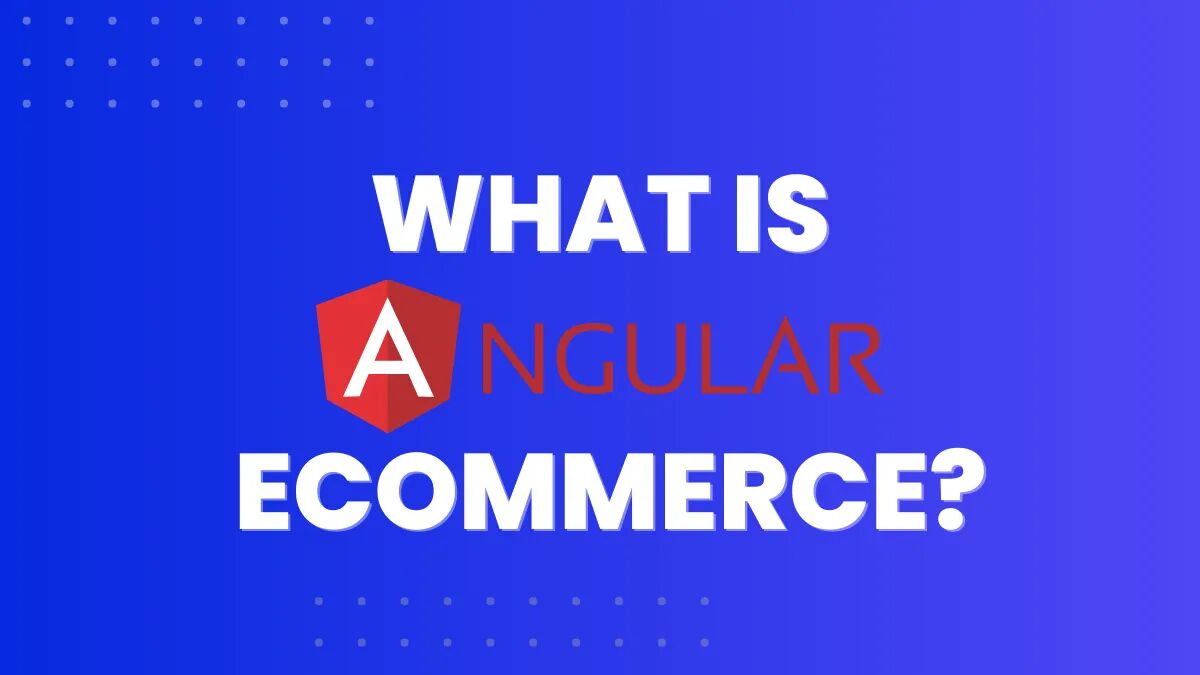If you’re looking to build an ecommerce store, Angular is a popular choice for creating robust and dynamic web applications.
In this article, we’ll explore what Angular ecommerce is and how it can be used to create an ecommerce store that meets the needs of both businesses and customers.
Table of Contents
What is Angular?

Angular is a TypeScript-based open-source web application framework that is maintained by Google. It’s used for building single-page applications (SPAs) and is designed to make it easy to build scalable and maintainable web applications.
Angular provides a comprehensive set of tools for building complex applications, including routing, form handling, and reactive programming.
Why use Angular for Ecommerce?
When it comes to ecommerce, businesses need a platform that can handle complex user interactions, data processing, and payment processing.
Angular provides a robust set of tools for building ecommerce stores that can handle these requirements. Here are some reasons why Angular is a great choice for ecommerce:
1. Component-based Architecture
Angular uses a component-based architecture that allows developers to create reusable UI components that can be used across the application. This makes it easy to build complex UIs and maintain them over time.
2. Reactive Programming
Reactive programming is a programming paradigm that allows developers to build responsive and scalable applications. Angular provides built-in support for reactive programming using RxJS, which makes it easy to handle complex user interactions and data processing.
3. Robust Routing
Routing is an essential part of any ecommerce store. Angular provides a robust routing system that allows developers to create complex navigation paths and handle complex user interactions.
4. Forms Handling
Forms are a critical part of any ecommerce store. Angular provides a comprehensive set of tools for handling forms, including form validation, form controls, and reactive forms.
5. Payment Processing
Payment processing is an essential part of any ecommerce store. Angular provides a range of tools for integrating payment gateways and processing payments, including Stripe and PayPal.
Building an Ecommerce Store with Angular
Now that we’ve explored why Angular is a great choice for ecommerce, let’s dive into how to build an ecommerce store with Angular. Here are the steps you need to follow:
1. Planning and Design
The first step in building an ecommerce store is planning and design. You need to define the requirements of the store, including the product catalog, user flows, and payment processing. You also need to design the user interface and user experience.
2. Setting up the Development Environment
Once you have a plan and design in place, the next step is to set up your development environment. You need to install Angular and set up a development environment that includes a code editor, a web server, and a database.
3. Creating Components
The next step is to create the components that make up your ecommerce store. These components include the product catalog, shopping cart, checkout process, and user account pages.
4. Handling Data
Once you have your components in place, you need to handle data. This includes loading product data from a database, storing shopping cart data in local storage, and handling user account data.
5. Handling Payment Processing
Finally, you need to integrate payment processing into your ecommerce store. This includes integrating with a payment gateway, handling payment data securely, and processing payments.
Best Practices for Building an Ecommerce Store with Angular
Here are some best practices to keep in mind when building an ecommerce store with Angular:
1. Use Lazy Loading
Lazy loading is a technique for loading components only when they are needed. This can help improve performance and reduce page load times.
2. Use Angular Universal
Angular Universal is a tool for server-side rendering of Angular applications. Using Angular Universal can help improve the performance of your ecommerce store by pre-rendering pages on the server, which can improve load times and SEO.
3. Use Reactive Forms
Reactive forms are a powerful tool for handling complex forms in Angular. They provide a declarative way to manage form data and handle validation and error handling.
4. Use NgRx for State Management
NgRx is a state management library for Angular that provides a reactive approach to managing application states. Using NgRx can help simplify your code and make it easier to manage complex states in your ecommerce store.
5. Use A/B Testing
A/B testing is a technique for testing different versions of your ecommerce store to see which one performs better. This can help you optimize your store for conversions and improve the overall user experience.
Conclusion
In conclusion, Angular is a great choice for building ecommerce stores that are scalable, responsive, and easy to maintain. By following best practices and using the built-in tools provided by Angular, you can create a robust and reliable ecommerce store that meets the needs of both businesses and customers.
With its component-based architecture, reactive programming, and comprehensive set of tools for handling forms and payment processing, Angular is a powerful platform for building ecommerce stores that can handle the complex requirements of modern online shopping.
Also Read: Best Products to Sell Online
FAQ On Angular Ecommerce
Is Angular difficult to learn?
Angular has a steep learning curve, but once you master the basics, it can be easy to use and maintain.
Is Angular a good choice for small ecommerce stores?
Angular can be a good choice for small ecommerce stores, but it may be overkill for very simple stores.
Can I use Angular with any payment gateway?
Angular can be used with any payment gateway that provides an API for integrating with web applications.
Can I use Angular to build a mobile app?
Yes, Angular can be used to build mobile apps using tools like Ionic or NativeScript.
Is Angular suitable for enterprise-level ecommerce stores?
Yes, Angular is suitable for enterprise-level ecommerce stores, as it provides a scalable and maintainable platform for building complex web applications.
